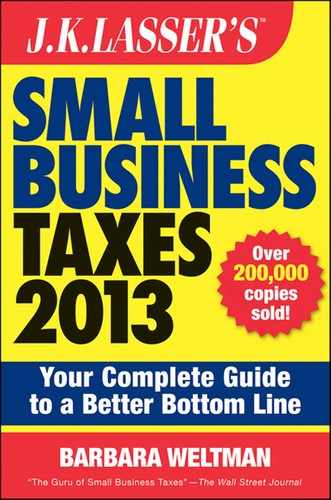Filing Deadlines and Extensions
The date by which your business return must be filed depends on your type of entity and tax year. The information in Table 30.1 applies to businesses reporting on a calendar-year basis.
TABLE 30.1 Filing Deadlines
| Type of Entity | Income Tax Return | Return Due Date |
| Sole proprietorship | Schedule C (or C-EZ) of Form 1040 | April 15 |
| Partnership | Form 1065 | April 15 |
| Limited liability company | Form 1065 | April 15 |
| S corporation | Form 1120S | March 15 |
| C corporation | Form 1120 | March 15 |
Partnerships, limited liability companies, and S corporations must also furnish owners with a Schedule K-1 by the due date.
For corporations on a fiscal year, the due date is 2½ months after the close of their fiscal year. For example, a C corporation on a fiscal year ending on June 30 has a filing deadline of September 15.
For all other entities on a fiscal year, the due date is 3½ months after the close of their fiscal year. For example, a limited liability company reporting on a fiscal year ending September 30 has a filing deadline of January 15 of the following year.
If any due date falls on a Saturday, Sunday, or legal holiday, the due date becomes the next business day. For example, the deadline for furnishing W-2s to employees for 2009 was February 1, 2010, because January 31 was on a Sunday. W-2s for 2012 must be furnished by January 31, 2013.
Filing Methods
Small business owners can choose to file paper returns or file electronically; certain large entities must file electronically (explained later in this chapter). The filing method does not affect the filing deadline.
Filing Extensions
If, for any reason, you are unable to file on time, you can avoid penalties by requesting an automatic 6-month filing extension (5 months for partnership returns). The request must be made no later than the due date of the return (see Table 30.1). The form used to request the extension and the extended due date depends on your type of entity, as shown in Table 30.2.
TABLE 30.2 Filing Extensions
| Form to Request | ||
| Type of Entity | Filing Extension | Extended Due Date |
| Sole proprietorship | Form 4868 | October 15 |
| Partnership | Form 7004 | September 15 |
| Limited liability company | Form 7004 | September 15 |
| S corporation | Form 7004 | September 15 |
| C corporation | Form 7004 | September 15 |
There are no extensions available beyond the extended due date, regardless of the reasons involved; returns filed after the extended due date are usually subject to penalty. The only exception to the rule against having more time to file is a blanket extension granted by the IRS to taxpayers located in certain areas affected by extreme disasters. Find news about this on an IRS landing page entitled “Tax Relief in Disaster Situations” at www.irs.gov/uac/ Tax-Relief-in-Disaster-Situations.
Late Filing Penalties
If you fail to file your return on time—by the due date or the extended due date if you obtain a filing extension—you will be subject to a late filing penalty. A penalty can apply in some cases even if you have deposited your taxes on time and owe no additional tax with your return.
The late filing penalty is usually 0.5% of the amount due for each month or part of a month that the return is late, up to a maximum of 25% of the tax due. However, the penalty increases to 15% of the amount due for each month or part of a month that the return is late, up to a maximum of 75% of the tax due, if the failure to file is fraudulent. If the return is more than 60 days late, the minimum penalty is $100 or the amount of any tax due, whichever is smaller.
For partnerships, there is a late filing penalty of $195 per owner per month for up to 12 months. Similarly, for S corporations, the penalty is $195 per owner per month up to 12 months. All owners for any part of the year are taken into account in figuring this penalty.
PENALTY ABATEMENT
You can ask to have penalties waived if you have reasonable cause for not filing on time. This penalty abatement must be requested by you; it is not granted automatically by the IRS. To request abatement of penalties, send the IRS your own written statement explaining the reasons why you were unable to file on time. You must sign the statement under penalty of perjury.
For small partnerships and S corporations (those with 10 or fewer owners), reasonable cause is met automatically if all owners are natural persons (and not nonresident aliens), all owners receive equal allocations of each entity item, and all owners have reported these items on their personal returns.
